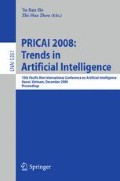Abstract
We propose a framework to allow an agent to cope with inconsistent beliefs and to handle conflicting inferences. Our approach is based on a well-established line of research on assumption-based argumentation frameworks and defeasible reasoning. We propose a language to allow defeasible assumptions and context-sensitive priorities to be explicitly expressed and reasoned about by the agent. Our work reveals some interesting problems to conditional priority-based argumentation and establishes the fundamental properties of these frameworks. We also establish a sufficient condition for a conditional priority-based argumentation to have a unique stable extension based on the notion of stratification.
Access this chapter
Tax calculation will be finalised at checkout
Purchases are for personal use only
Preview
Unable to display preview. Download preview PDF.
References
Amgoud, L., Cayrol, C.: Inferring from inconsistency in preference-based argumentation frameworks. J. Autom. Reason. 29(2), 125–169 (2002)
Antoniou, G.: Defeasible logic with dynamic priorities. Int. J. Intell. Syst. 19(5), 463–472 (2004)
Apt, K.R., Blair, H.A.: Arithmetic classification of perfect models of stratified programs. Fundam. Inform. 14(3), 339–343 (1991)
Apt, K.R., Blair, H.A., Walker, A.: Towards a theory of declarative knowledge. In: Minker, J. (ed.) Foundations of deductive databases and logic programming, pp. 89–148. Morgan Kaufmann Publishers Inc., San Francisco (1988)
Bench-Capon, T.J.M.: Persuasion in Practical Argument Using Value-based Argumentation Frameworks. J Logic Computation 13(3), 429–448 (2003)
Bondarenko, A., Dung, P.M., Kowalski, R.A., Toni, F.: An abstract, argumentation-theoretic approach to default reasoning. Artificial Intelligence Journal 93, 63–101 (1997)
Brewka, G.: Reasoning about priorities in default logic. In: AAAI, pp. 940–945 (1994)
Dung, P.M.: On the acceptability of arguments and its fundamental role in nonmonotonic reasoning, logic programming and n-person games. Artificial Intelligence Journal 77, 321–357 (1995)
Dung, P.M., Mancarella, P., Toni, F.: Computing ideal sceptical argumentation. Artif. Intell. 171(10-15), 642–674 (2007)
Dung, P.M., Son, T.C.: An argument-based approach to reasoning with specificity. Artif. Intell. 133(1-2), 35–85 (2001)
Elvang-Gøransson, M., Hunter, A.: Argumentative logics: Reasoning with classically inconsistent information. Data Knowl. Eng. 16(2), 125–145 (1995)
Elvang-Gøransson, M., Krause, P., Fox, J.: Acceptability of arguments as ‘logical uncertainty’. In: ECSQARU, pp. 85–90 (1993)
Gelfond, M.: On stratified autoepistemic theories. In: AAAI, pp. 207–211 (1987)
Governatori, G., Maher, M.J., Antoniou, G., Billington, D.: Argumentation semantics for defeasible logic. J. Log. Comput. 14(5), 675–702 (2004)
Horty, J.F., Thomason, R.H., Touretzky, D.S.: A skeptical theory of inheritance in nonmonotonic semantic networks. Artif. Intell. 42(2-3), 311–348 (1990)
Prakken, H., Sartor, G.: Argument-based extended logic programming with defeasible priorities. Journal of Applied Non–classical Logics 7, 25–75 (1997)
Vo, Q.B., Foo, N.Y.: Reasoning about action: An argumentation-theoretic approach. Journal of Artificial Intelligence Research 24, 465–518 (2005)
Vo, Q.B., Foo, N.Y., Thurbon, J.: Semantics for a theory of defeasible reasoning. Annals of Mathematics and Artificial Intelligence 44(1-2), 87–119 (2005)
Author information
Authors and Affiliations
Editor information
Editors and Affiliations
Rights and permissions
Copyright information
© 2008 Springer-Verlag Berlin Heidelberg
About this paper
Cite this paper
Vo, Q.B. (2008). An Argumentation Framework Based on Conditional Priorities. In: Ho, TB., Zhou, ZH. (eds) PRICAI 2008: Trends in Artificial Intelligence. PRICAI 2008. Lecture Notes in Computer Science(), vol 5351. Springer, Berlin, Heidelberg. https://doi.org/10.1007/978-3-540-89197-0_46
Download citation
DOI: https://doi.org/10.1007/978-3-540-89197-0_46
Publisher Name: Springer, Berlin, Heidelberg
Print ISBN: 978-3-540-89196-3
Online ISBN: 978-3-540-89197-0
eBook Packages: Computer ScienceComputer Science (R0)

